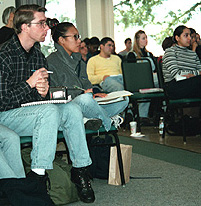![[Currents header graphic]](/homeart/currents_header.gif)
![[Currents header graphic]](/homeart/currents_header.gif)
March 1, 1999
During a lunchtime panel discussion on affirmative action, psychology professor Faye Crosby recalled a story her son told her about walking down the street with an African American friend from college. Her son noticed that women were crossing the street to avoid them.

|
|
Nearly 500 people attended an affirmative action forum at Stevenson College during the course of the daylong event (more photos)
|
That's when her son realized that he carries "a backpack of privilege" as a white male, recalled Crosby, an advocate of affirmative action who says she supports the policy in part for her sons--so they can succeed "without that backpack of privilege."
Crosby's remarks came as part of a daylong forum February 19 on affirmative action that was sponsored by a broad coalition of campus organizations.
Nearly 200 people gathered for the noon panel on "Deconstructing Arguments Against Affirmative Action." In addition to Crosby, panelists included community studies lecturer Mike Rotkin, psychology professor Craig Haney, and associate professor of sociology Dana Takagi.
The goal of the forum was to educate students, faculty, and staff about the historical background and complex issues surrounding affirmative action and to help organize a campaign for affirmative action in California.
Judy Yung, associate professor of American studies and chair of the Academic Senate Committee on Affirmative Action, which helped to organize the forum, said the forum attracted about 500 people throughout the day.
"It was rich with information and discussion," said Yung. "We were able to cover a lot of ground and correct a lot of misinformation about affirmative action."
Audience members were encouraged to participate by asking questions or submitting them on index cards, said Yung, noting that topics included preferential treatment, reverse discrimination, qualifications, and alternatives to affirmative action, such as preferences based on class rather than race or sex.
Discussion also centered on ways the university can make the campus environment more supportive of students of color by increasing faculty diversity and improving student services in areas such as financial aid, academics, and emotional support.
In the final panel, veteran activists discussed the need to organize for affirmative action both within and outside of the system, said Yung. Participants included Bettina Aptheker, professor of women's studies; Marge Frantz, lecturer emerita in women's studies; Aída Hurtado, psychology professor; Jessica Delgado, a UCSC and Boalt School of Law graduate who organized the effort to qualify an anti-Proposition 209 initiative for the ballot; and Shirley Flores-Munoz, a UCSC alumna who teaches women's studies at Cabrillo College.
The forum was an educational follow-up to last October's teach-in on affirmative action (see story). For those who missed the forum, a videotape is available at McHenry Library, and copies of the UCSC Affirmative Action Reader can be ordered from the UCSC Copy Center for $12.38 each. The reader includes four sections: basic laws and court cases on affirmative action, the public debate on affirmative action, essays by UCSC faculty, and a selected bibliography.
Organizers of the forum plan to turn their attention to bringing high-profile individuals to campus to discuss affirmative action in education and related topics, said Yung.
At the top of the list are William G. Bowen and Derek Curtis Bok, the authors of The Shape of the River, an empirical study of the effects of affirmative action in higher education. The book traces the progress of 45,000 students at 28 elite universities over 20 years and concludes that affirmative action policies created the backbone of the black middle class, as well as taught white students the value of integration.
Yung also hopes to arrange a visit to campus by Mari Matsuda, a law professor at Georgetown University and an expert on racist speech and affirmative action.
"I see our work as continuing to correct misconceptions about affirmative action and keeping the issue out there," said Yung. "We still need it."